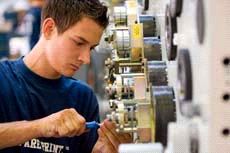Offset Printing
printservices: manroland ready around the world

Friday 18. June 2010 - Service hubs on every continent for fast support
Well-trained service technicians from the web offset sector are stationed at seven newly created service hubs and at our market organizations forty locations around the world. These people are our customers trusted contact: always close, theyre ready to provide their expertise for everything from commissioning, preventative maintenance and servicing, to offering quick help in emergencies.
manroland is currently deploying additional technicians from the web offset sector to reinforce its on-site presence around the world. Previously, specialists had to fly from Germany to wherever help was needed. “The advantage of being close to the customer is enormous,” says Jens Maul, Vice President of printservices web offset systems. “Our specialists know their presses, their customers, and not least, the country, its people, language and regional characteristics. Six technical and electrical specialists, for just one example, have been stationed in Dubai since 2007 together with our sales partner Dynagraph. Their theater of operation covers ten countries of the Arabian peninsula. In this region alone the team looks after more than 30 newspaper and commercial presses. The service hubs successively set up in Australia, North, Central and South America, as well as in South Africa and south-east Asia, work the same way. This means that our customers now have a direct manroland contact in their own region, instead of primarily Ferrostaal employees, as it was in the past.”
Pro-active and preventative
Working on-site with printing companies is a straightforward partnership based on a plannable budget and on printservices range of benefits: In the web offset sector, customers can also combine individual services, such as press upkeep, thermgraphy, enhanced inspections, a 24-hour hotline and 24-hour service, and training courses. Whats decisive is the regular presence of the technicians at the customer. They check the presses, discover potential issues in advance, take preventative measures, and recommend sensible, planned maintenance intervals. In this way, they help companies not only improve their press performance and availability, but also keep repair costs down and ensure the lasting value of the entire press system.
